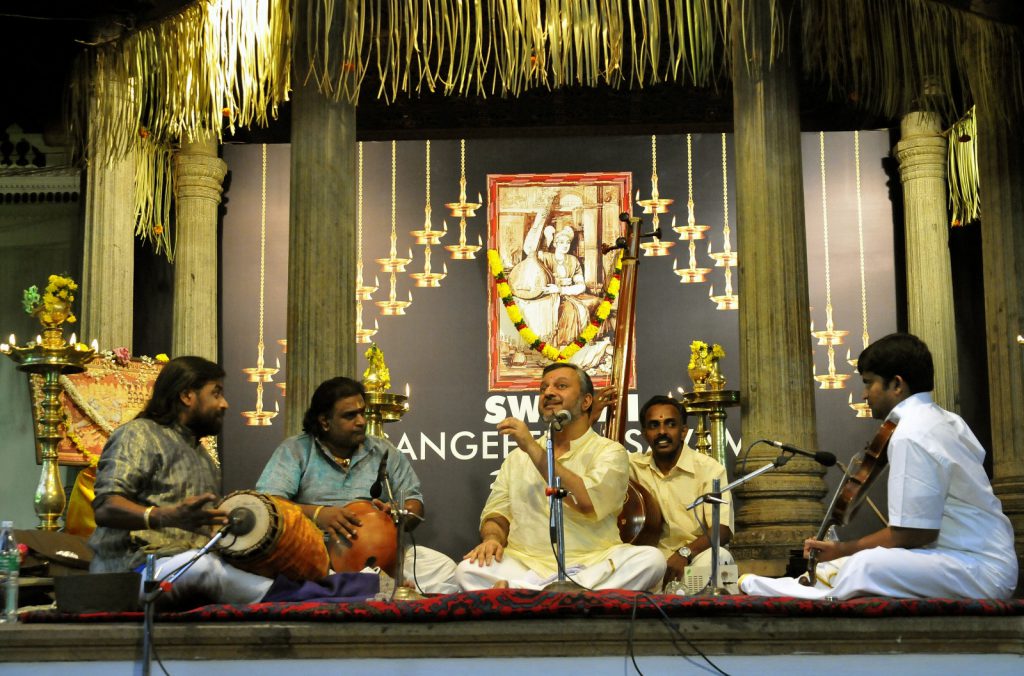

India is a land of festivals. Be it music or dance, drama or folk arts, these complement the secular nature of the country and make India unique. Music and dance are integral parts of any Indian celebration. The two forms of Indian classical music, Hindustani (originating from the North) and Carnatic (from the South), are very expressive. Of the two, Carnatic music tends to be significantly more structured. If one thinks of music as a medium for man to celebrate in the modern day, here in Thiruvananthapuram, the capital city of God’s own country, Kerala, a memorable musical experience awaits you – “ Swathi Sangeethotsavam” – an unbelievable experience of a lifetime for music lovers all over the world. Held every January, in the festive mood of the New Year, it is a tribute to the prolific king-composer, Maharaja Swathi Thirunal, and is open to all.
The Kuthiramalika palace is the exalted venue that hosts this premier festival of Indian classical music. Maharaja Swathi Thirunal, a king whose legacy was mired in triumph and tragedy, lived and composed his timeless pieces in Kuthiramalika. The palace is very close to Sri Padmanabhaswamy Temple, the richest temple in the world. From January 4 to13, in the palace grounds, the Royal Family of Travancore conducts the Swati Sangeethotsavam, an annual music festival in honour of their illustrious ancestor, ensuring that music lives on in the palace. It is only a fitting honour for a Maharaja remembered for composing both Carnatic and Hindustani pieces and poetry, to have them performed in the same palace that he lovingly constructed for the enjoyment of beauty, religion, and the senses. The Kuthiramalika Palace is unusual. The architecture, exhibits, and music that emerges from its podium evoke an important period in the history of Travancore and the life of its philosopher king, made all the more real by the infectious enthusiasm of the guides at the palace. The palace, which is adorned with flowers and traditional Kerala oil lamps, creates a very special ambiance for the offering to Saraswathi, the Goddess of music.
Prince Aswathi Thirunal Rama Varma, the organizer, and the secret behind the enviable success of this music festival is a musician himself, and a direct descendant of Maharaja Swathi Thirunal. The Prince takes a phenomenal effort to make this palace an important venue in the world of music, and not merely a tourist spot in Kerala. Prince Rama Varma, who impresses us with his scholarship rather than showmanship, is a soft-spoken Prince, a highly accomplished musician and musicologist, vocalist, and a gifted veena player. His initial interest in music began by listening to the great Carnatic vocalist M D Ramanathan and Hindi film singer, Kishore Kumar. Openness to, and awareness and appreciation of, different genres and types of world music is what sets this Carnatic musician apart.
The Swathi Sangeethotsavam and Navarathri Mandapam festivals portray the brilliance of Rama Varma both as a gifted musician and an excellent organiser. While the Swathi Sangeethotsavam attracts an international crowd, the Navarathri Mandapam festival, rooted in religion and tradition, coincides with the Navarathri celebrations that take place later in the year, all over the country.
Prince Rama Varma chose music as a medium to inspire this fast-moving world with different possibilities. His music is widely admired for its soulful nature and technical mastery. According to the Prince, listening to, and appreciating, other kinds of music helps him better define and interpret Carnatic music. As a worldwide traveler and voracious reader, the interaction with different cultures and communities and other forms of music has influenced the personality and musical performance of this musician among Princes and made him the musical ambassador of India.
Also, Read
https://www.youtube.com/watch?v=RHaDc7x6C18
